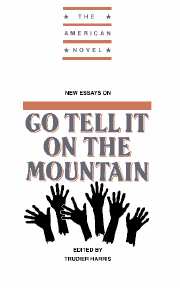Book contents
- Frontmatter
- Contents
- Series Editor's Preface
- 1 Introduction
- 2 A Glimpse of the Hidden God: Dialectical Visions in Baldwin's Go Tell It on the Mountain
- 3 The South in Go Tell It on the Mountain: Baldwin's Personal Confrontation
- 4 Wrestling with “The Love That Dare Not Speak Its Name”: John, Elisha, and the “Master”
- 5 Ambivalent Narratives, Fragmented Selves: Performative Identities and the Mutability of Roles in James Baldwin's Go Tell It on the Mountain
- 6 Baldwin, Communitas, and the Black Masculinist Tradition
- Notes on Contributors
- Selected Bibliography
2 - A Glimpse of the Hidden God: Dialectical Visions in Baldwin's Go Tell It on the Mountain
Published online by Cambridge University Press: 05 June 2012
- Frontmatter
- Contents
- Series Editor's Preface
- 1 Introduction
- 2 A Glimpse of the Hidden God: Dialectical Visions in Baldwin's Go Tell It on the Mountain
- 3 The South in Go Tell It on the Mountain: Baldwin's Personal Confrontation
- 4 Wrestling with “The Love That Dare Not Speak Its Name”: John, Elisha, and the “Master”
- 5 Ambivalent Narratives, Fragmented Selves: Performative Identities and the Mutability of Roles in James Baldwin's Go Tell It on the Mountain
- 6 Baldwin, Communitas, and the Black Masculinist Tradition
- Notes on Contributors
- Selected Bibliography
Summary
Just above my head
I hear music in the air
And I really do believe
There's a God somewhere.
(gospel song)The whole question … of religion has always really obsessed me.
A Rap on Race 83James Baldwin is most commonly viewed in both the popular mind and the scholarly community as the eloquent voice of black rage of the 1960s and the prophet of black exasperation with the failures of the civil rights movement as expressed in the rebellions in the cities. The virtual association of Baldwin with black militancy and, at its extreme, the spirit of black vengeance of the late 60s is highly ironic, however, when one considers Baldwin's insistence that hatred of any kind amounts to self-destruction and that the individual bears responsibility to himself or herself for attaining self-knowledge and to others for offering reconciliation and love. Given his considerable, understandable anger, his explicit role as witness for African-Americans, and his exaggerated image as the enraged prophet of retribution, Baldwin would seem perhaps the least likely writer to assert the redemptive power of suffering, partly because such an association would contribute to the misperception that he was retrograde and reactionary. Yet he expands that theme implicitly through the early novels, plays, and essays, and through his middle and later work he continues to explore it despite considerable risk and damage to his reputation.
- Type
- Chapter
- Information
- New Essays on Go Tell It on the Mountain , pp. 29 - 58Publisher: Cambridge University PressPrint publication year: 1996
- 2
- Cited by

